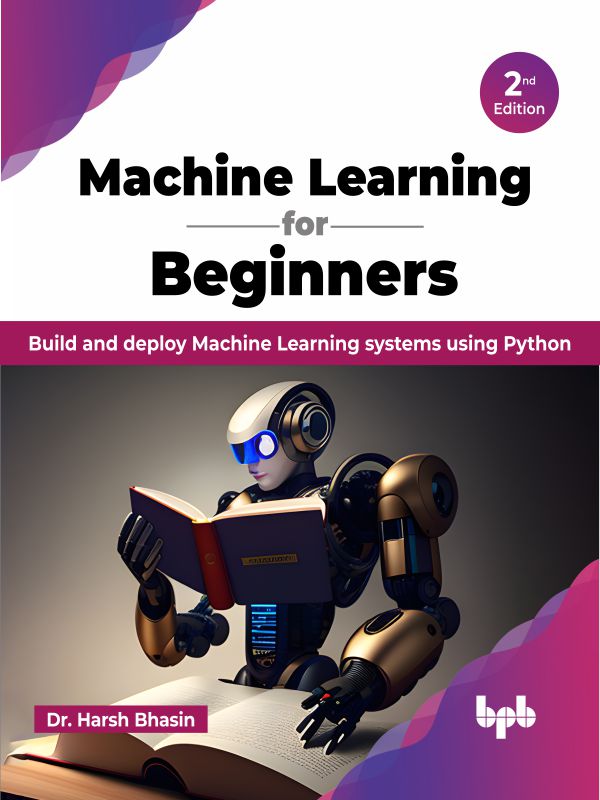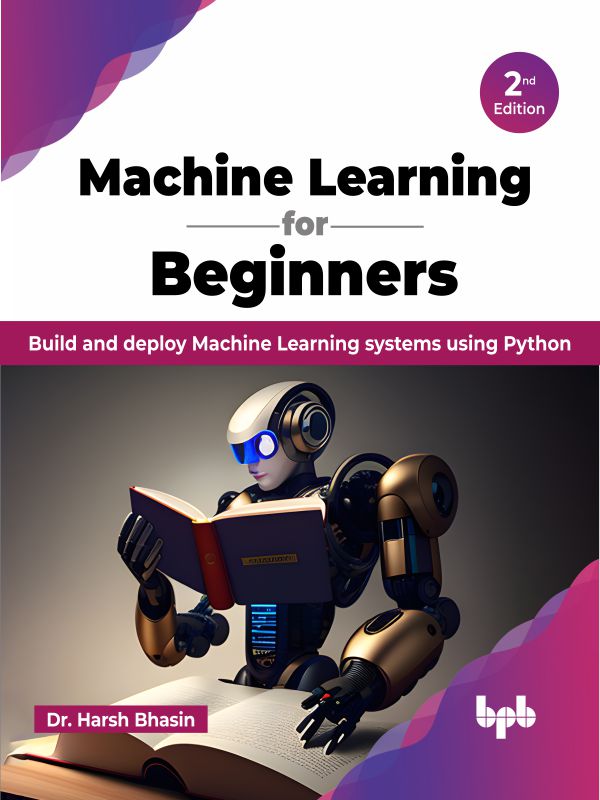Machine Learning for Beginners - 2nd Edition
Couldn't load pickup availability
FREE PREVIEW
ISBN: 9789355515636
eISBN: 9789355515643
Authors: Dr. Harsh Bhasin
Rights: Worldwide
Publishing Date: 16th Oct 2023
Pages: 384
Dimension: 7.5*9.25 Inches
Book Type: Paperback

- Description
- Table of Contents
- About the Authors
The second edition of “Machine Learning for Beginners” addresses key concepts and subjects in machine learning.
The book begins with an introduction to the foundational principles of machine learning, followed by a discussion of data preprocessing. It then delves into feature extraction and feature selection, providing comprehensive coverage of various techniques such as the Fourier transform, short-time Fourier transform, and local binary patterns. Moving on, the book discusses principal component analysis and linear discriminant analysis. Next, the book covers the topics of model representation, training, testing, and cross-validation. It emphasizes regression and classification, explaining and implementing methods such as gradient descent. Essential classification techniques, including k-nearest neighbors, logistic regression, and naive Bayes, are also discussed in detail. The book then presents an overview of neural networks, including their biological background, the limitations of the perceptron, and the backpropagation model. It also covers support vector machines and kernel methods. Decision trees and ensemble models are also discussed. The final section of the book provides insight into unsupervised learning and deep learning, offering readers a comprehensive overview of these advanced topics.
By the end of the book, you will be well-prepared to explore and apply machine learning in various real-world scenarios.
KEY FEATURES
* Develop a solid understanding of foundational principles in machine learning.
* Master regression and classification methods for accurate data prediction and categorization in machine learning.
* Dive into advanced machine learning topics, including unsupervised learning and deep learning.
WHAT YOU WILL LEARN
* Acquire skills to effectively prepare data for machine learning tasks.
* Learn how to implement learning algorithms from scratch.
* Harness the power of scikit-learn to efficiently implement common algorithms.
* Get familiar with various Feature Selection and Feature Extraction methods.
* Learn how to implement clustering algorithms.
WHO THIS BOOK IS FOR
This book is for both undergraduate and postgraduate Computer Science students as well as professionals looking to transition into the captivating realm of Machine Learning, assuming a foundational familiarity with Python.
Section I: Fundamentals
1. An Introduction to Machine Learning
2. The Beginning: Data Pre-Processing
3. Feature Selection
4. Feature Extraction
5. Model Development
Section II: Supervised Learning
6. Regression
7. K-Nearest Neighbors
8. Classification: Logistic Regression and Naïve Bayes Classifier
9. Neural Network I: The Perceptron
10. Neural Network II: The Multi-Layer Perceptron
11. Support Vector Machines
12. Decision Trees
13. An Introduction to Ensemble Learning
Section III: Unsupervised Learning and Deep Learning
14. Clustering
15. Deep Learning
Appendix 1: Glossary
Appendix 2: Methods/Techniques
Appendix 3: Important Metrics and Formulas
Appendix 4: Visualization- Matplotlib
Answers to Multiple Choice Questions
Bibliography
Dr. Harsh Bhasin is a researcher and practitioner. Dr. Bhasin is currently associated with the Centre for Health Innovations, Manav Rachna International Institution of Research and Studies. Dr. Bhasin has completed his Ph. D. in Diagnosis and Conversion Prediction of Mild Cognitive Impairment Using Machine Learning from Jawaharlal Nehru University, New Delhi. He worked as a Deep Learning consultant for various firms and taught at various Universities including Jamia Hamdard, MRU and DTU.
He has authored 11 books including Programming in C#, Oxford University Press, 2014; Algorithms, Oxford University Press, 2015; Python for Beginners, New Age International, 2018; Python Basics, Mercury, 2019; Machine Learning, BPB, 2020, to name a few.
Dr. Bhasin has authored more than 40 papers published in conferences and renowned journals including Alzheimer’s and Dementia, Soft Computing, Springer, BMC Medical Informatics & Decision Making, AI & Society, etc. He is the reviewer of a few renowned journals and has been the editor of a few special issues. He is a recipient of a distinguished fellowship.
His areas of expertise include Deep Learning, Algorithms, and Medical Imaging. Outside work, he is deeply interested in Hindi Poetry: the progressive era, and Hindustani Classical Music: percussion instruments.


